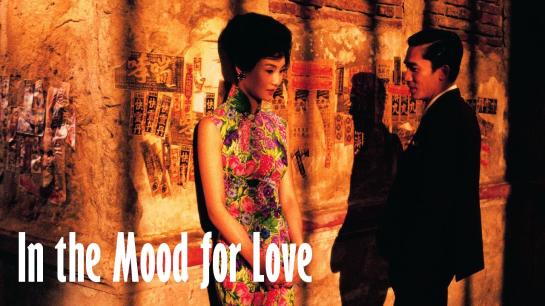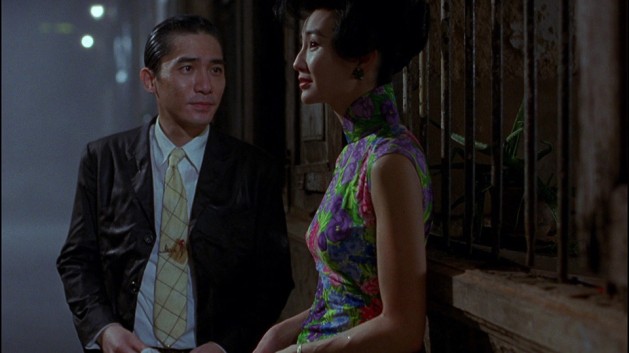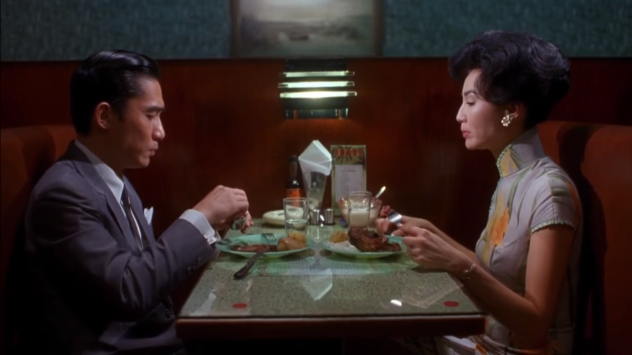
With such a passionate, seductive title, “In the Mood for Love” may tempt you to believe it is something it’s not. The film’s English title is based on “I’m In the Mood for Love”, a song made famous by the likes of Louis Armstrong, Frank Sinatra, and Nat King Cole among others. But unlike the song’s alluringly romantic sentiment, the film has a much more cynical perspective – cynical yet still intensely romantic.
There’s a key line in the film where a character asks “It was so nice then, wasn’t it?” In many ways that’s the question from the start. Early on the film conveys a feeling that we are looking back in time – that we are gazing on what might have been. Technically we aren’t, but writer and director Wong Kar-wai’s crafty approach leaves us wondering. Elements of time do play into the story and the aching hearts of the two main characters intensifies the more time passes by.

The film features popular Asian stars Tony Leung and Maggie Cheung. Their story begins in the crowded, changing 1962 Hong Kong. Both are stable career people. Leung plays a reporter named Chow while Cheung plays an executive’s assistant named Su. They end up moving next door in the same tight apartment building. Everything seems pretty stable except for one thing – their marriages. As it turns out their spouses are having an affair together and that discovery serves as the catalyst for their unique relationship.
Wong Kar-wai’s hypnotic story structure elegantly drifts back-and-forth between dreamy and bruising reality. There are no dream sequences – only soothing interludes in tune with the narrative’s continuity yet feeling almost otherworldly. It’s here that the camera steals the show. Scene after scene features Kar-wai’s masterful blend of lyrical and visual.

The story moves at a deliberate but meaningful pace. Su and Chow are two bruised souls who in each other find an outlet to reckon with their pain and feelings of betrayal. They role-play in an attempt to figure out who made the first adulterous move. They rehearse the best way to confront their cheating spouses. Yet during all of their time together they are determined not to commit the same sins. Ironically it’s a misunderstanding of this pledge that proves to be their biggest hurdle to true healing and happiness.
As I mentioned “In the Mood for Love” is intensely romantic but painfully so. There is a continual aching from title screen to end credits. It’s emphasized through the film’s mesmerizing cinematography and composer Shigeru Umebayashi’s entrancing “Yumeji’s Theme”. Wong Kar-wai keeps everything moving at his pace and with his two main characters as the focus. We never once see the faces of the adulterers. We see their backs and hear their voices but that’s it. So many movies like to put the cheaters in the spotlight. This film is much more interested in the real people left in their wake.
VERDICT – 4.5 STARS


The first film by Wong Kar-Wai that I have seen and remains one of my all-time favorite films. It’s just so beautiful and I just find it sexy in the way Maggie Cheung moves to “Yumeji’s Theme” in that dress.
It’s fabulous. I just loved it.
I saw this for the first time last year and it is a really is a mesmerizing picture. Christopher Doyle’s cinematography in particular is stunning, and the way how he and Kar-Wai capture such imagery is mind-blowing.
It’s so seductive which is interesting considering the barrier between the two main characters. And I was thrilled with Kar-wai’s wonderful non-western ending. Just so much to like about it.
I must see this one. I’m thinking of taking part in the Blindspot series next year. So many films that I’ve yet to witness.
Oh man it is soooo good. I absolutely love it. It’s such a seductive moody piece.
Seductive moody piece, you had me with those words.